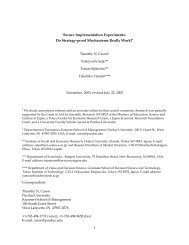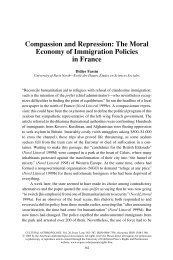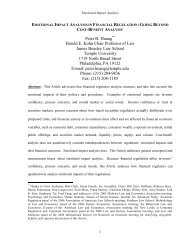Governance, Growth, and Development Decision-making - School of ...
Governance, Growth, and Development Decision-making - School of ...
Governance, Growth, and Development Decision-making - School of ...
You also want an ePaper? Increase the reach of your titles
YUMPU automatically turns print PDFs into web optimized ePapers that Google loves.
growth <strong>and</strong> stable liberal democracy 11 is presumably mediated by<br />
this channel: growth entails the emergence <strong>of</strong> new social actors who<br />
then dem<strong>and</strong> representation in a more open political system. If the<br />
political system succeeds in incorporating these actors, this is positive<br />
for both political stability <strong>and</strong> long-term growth, as in the case<br />
<strong>of</strong> contemporary Korea.<br />
The distribution <strong>of</strong> growth can also have a critical impact on social<br />
stability. Many observers have pointed to the importance <strong>of</strong> l<strong>and</strong><br />
reform in Japan, South Korea, <strong>and</strong> Taiwan prior to their high-growth<br />
periods, <strong>and</strong> subsequent investments in human capital, which<br />
further helped to ensure that growth would be evenly distributed.<br />
Latin America, by contrast, has been characterized over the past<br />
two centuries by high degrees <strong>of</strong> social inequality, by which elites<br />
have protected their own property rights <strong>and</strong> underinvested in human<br />
capital. Despite the existence <strong>of</strong> formal democratic institutions,<br />
inequality has been transmitted over the generations. As recent research<br />
has shown, partial property rights regimes can be successful<br />
at underpinning growth for sometimes prolonged periods, but they<br />
can then be interrupted by zero-sum conflicts over redistribution<br />
that account for the region’s long-term lagging performance.<br />
4. <strong>Development</strong> Strategies<br />
The fact that there are at least five separate economic, political, <strong>and</strong><br />
social dimensions <strong>of</strong> development suggests that any one <strong>of</strong> them<br />
could be an entry point for a development strategy. One important<br />
school would prioritize some combination <strong>of</strong> economic development,<br />
state-building, <strong>and</strong> rule <strong>of</strong> law over democracy or social<br />
mobilization. Huntington (1968) <strong>and</strong> Zakaria (2003), 12 noting that<br />
11<br />
Lipset, Seymour Martin, (1959). “Some Social Requisites <strong>of</strong> Democracy:<br />
Economic <strong>Development</strong> <strong>and</strong> Political Legitimacy,” American Political Science<br />
Review 53: 69–105<br />
12<br />
Huntington, Samuel P., (1968). Political Order in Changing Societies (New<br />
Haven: Yale University Press)<br />
Zakaria, Fareed, (2003). The Future <strong>of</strong> Freedom: Illiberal Democracy at<br />
Home <strong>and</strong> Abroad (New York: W. W. Norton)<br />
Francis Fukuyama 31
















